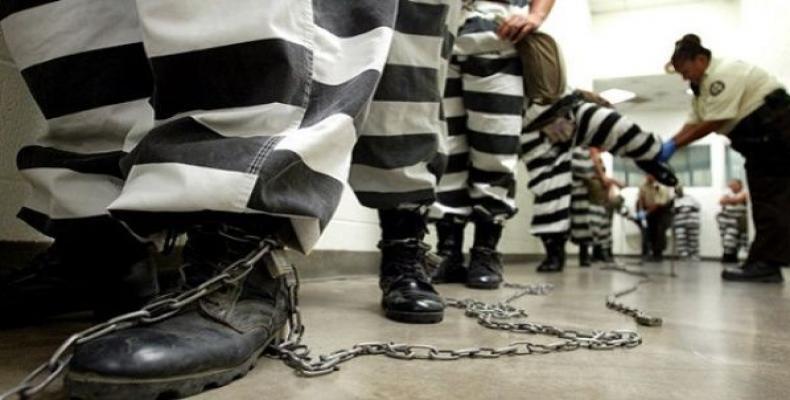Washington, February 17 (RHC)-- U.S. President Donald Trump has begun to follow through on his promise to crack down on immigration and roll out harsh border security. And while undocumented immigrants will face the gravest repercussions, private prisons, on the other hand, stand to be the biggest beneficiaries.
In just two weeks since Trump signed an executive order calling for the expansion of immigrant detention facilities at or near the border with Mexico, stocks for private prison companies have surged.
While the Barack Obama administration implemented the most heavy-handed measures against immigrants compared to any other president — actions that earned him the monicker “deporter-in-chief” — Trump is expected to substantially ramp-up the mass immigrant detention system Obama put in place.
Prisons are already filled with immigrant detainees, and critics warn that Trump's anti-immigrant policies and mass arrests are likely to exacerbate the poor conditions. Carl Takei, a staff attorney at the American Civil Liberties Union’s National Prison Project, told the LA Times that there is likely to be “an enormous boondoggle for the private prison industry.”
“The immigration system already lacks rigorous oversight and transparency,” he explained. “And now there’s this perfect storm — a push to rapidly expand the system, a lack of existing oversight and the profit motive driving these companies.”
Private prison companies already provide a much lower cost to keep inmates, compared to federally run Immigration and Customs Enforcement facilities. That profit motive is at the expense of decent conditions in these centers.
A prime example is the Willacy County Correctional Center, in Willacy County, Texas. Conditions in the prison were so bad that detainees engaged in a mass uprising, cutting and burning holes in their tents, wielding pipes and brooms and taking control of the prison for nearly two days. After the incident, the Bureau of Prisons shut down the facility in 2015, deeming it “uninhabitable,” and transferred all the inmates to other federal prisons.
“The level of human suffering was just unbelievable,” Kathleen Baldoni, a former Willacy nurse, told a congressional briefing in 2009. In addition, a 2010 human rights report stated that for every 1,358 inmates, there was only one physician on staff. The next year, a PBS documentary investigated more than a dozen allegations of sexual abuse by Willacy guards.
With Trump and his anti-immigration policies in the White House, heavy-handed immigration enforcement is likely to continue to rely on private prisons with just as squalid conditions. And the private corporations are already salivating over the prospect.
According to the Associated Press, the largest private prison operator in the U.S., CoreCivic — formerly the Corrections Corporation of America — has said it is able to provide the extra detention facilities needed to enforce Trump's executive orders on immigration.
The corporation's stocks had slumped last year when the Barack Obama administration inched toward easing private prison use, but the company's economic outlook bounced back with a 43 percent jump in its stocks the day after Trump's election.
Trump’s executive order requires the detention of all migrants that cross the southern border, including minors and women with children. In 2016, more than 400,000 migrants were apprehended when crossing the border.
John Kelly, Trump's pick for Department of Homeland Security secretary, will lead the crackdown by tripling the number of U.S. Customs and Border Protection agents to have more manpower to deport and detain any migrant who tries to cross, including families, minors and asylum seekers regardless of their rights under U.S. and international laws.
Private Prisons to Profit Off Trump Immigrant Raids


